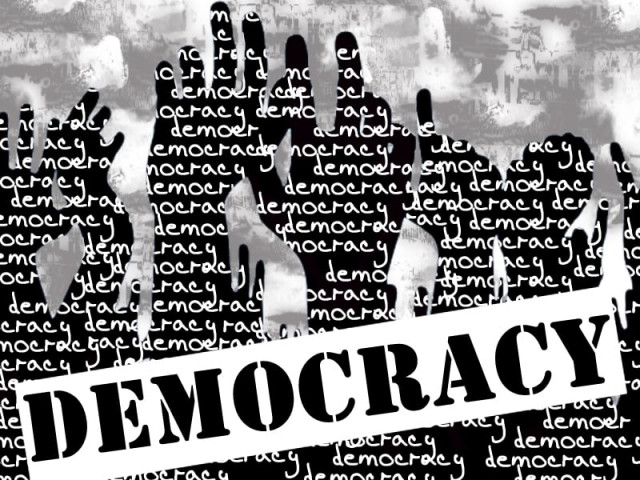Challenges and expectations: ‘Youth must play a role in building democracy’
Speakers at PILDAT forum urge young people to read up about Pakistan.

“A democratic society is a civil society. It allows the youth to play an important role to create a culture in line with democracy, liberty and freedom,” says Ambassador of Denmark Jesper Moller Sorensen. DESIGN: SUNARA NIZAMI
“I am confident that the civil society and the youth can take Pakistan in the right direction...towards democracy and peace,” Ambassador of Denmark Jesper Moller Sorensen said on Wednesday.
He was speaking at a forum organised by PILDAT under a project titled Supporting the Monitoring of Democracy, Electoral Reforms and Development of Youth in Pakistan, in collaboration with the Danish International Development Agency (DANIDA).
The forum on Pakistan, Youth and Democracy aimed to create awareness regarding challenges for democracy and the youth’s role in strengthening democracy. Young parliamentarians, students, members of youth wings of some political parties and former members of the Youth Parliament Pakistan participated.
Ambassador Sorensen was the guest of honour, and former minister Javed Jabbar and journalist Ghazi Salahuddin were the keynote speakers.
PILDAT president Ahmed Bilal Mehboob presented an overview of the assessment of a report on the Quality of Democracy in First 100 days of National and Provincial Governments in Pakistan.
Ambassador Sorensen said, “A democratic society is a civil society. It allows the youth to play an important role to create a culture in line with democracy, liberty and freedom.” He said that Denmark support such a culture “because we want to make sure that Pakistan continues to move in a direction where democratic voices are heard”.
He said their partnership with PILDAT aimed to promote democratic values among the youth of Pakistan. “I am proud to say that Denmark is supporting processes that are important for the future of Pakistan. Our partnership with PILDAT has provided us the opportunity to remain active in bringing about electoral reforms for the general elections as well,” he said.
Jabbar said, “Youth is not defined by one’s age but by one’s dreams and visions. He said democracy allows citizens to participate in decision making processes that directly affected them. A democratic system doesn’t necessarily mean a parliamentary system, said Jabbar. “We should not shy away from exploring the presidential form of government, in which citizens elect their president directly...that is more suitable for Pakistan,” he said.
The best electoral reform would be to make voting compulsory as it was in 35 other countries, he said. The youth must employ reasoned dialogue, respect opinions and exercise tolerance if they want to prosper and make democracy sustainable, he said.
Ghazi Salahuddin lamented the decline in the culture of reading books. That was the biggest crisis the youth faced, he said. The youth must explore the country and understand its various facets so it could represent it to the rest of the world.
On the importance of ideas, he said, “Democracy is an idea that changed the world.” The youth need to understand the concepts of equality and human rights so that they treat people as equals. “Malala is a brave girl because she read books. Imagination is the key to creating ideas. Our future depends on libraries, reading and day-dreaming,” said Salahuddin.
PILDAT president Mehboob said PILDAT’s Democracy Assessment Group had scored the strengthening of the democratic process at 44.5 per cent, it had been 44.2 per cent in 2012.
The Performance of Democracy marker had scored 25.6 per cent...it had been 20.9 per cent in 2012.
The aggregate score of the quality of democracy was 54 per cent... a marked improvement from the 45 per cent score in 2012.
He said Pakistan’s 10th general election, though not without flaws, was better and unlike the previous nine elections was subject to the rule of law. The independence of the Election Commission of Pakistan was assessed at 58.8 per cent, weaker than 63.4 per cent in 2012.
Mehboob said that weak governance, perception of corruption, insurgency and its ideological moorings, weak political parties and weak parliamentary oversight of the government and state institutions were challenges to democracy. “Our report shows that democracy is stronger than it has ever been in Pakistan...but until all citizens, especially the youth, get involved, achieving a sustainable democratic system is not possible,” he said.
Published in The Express Tribune, November 28th, 2013.


















COMMENTS
Comments are moderated and generally will be posted if they are on-topic and not abusive.
For more information, please see our Comments FAQ